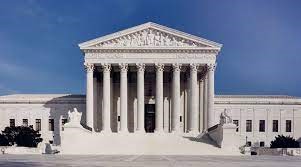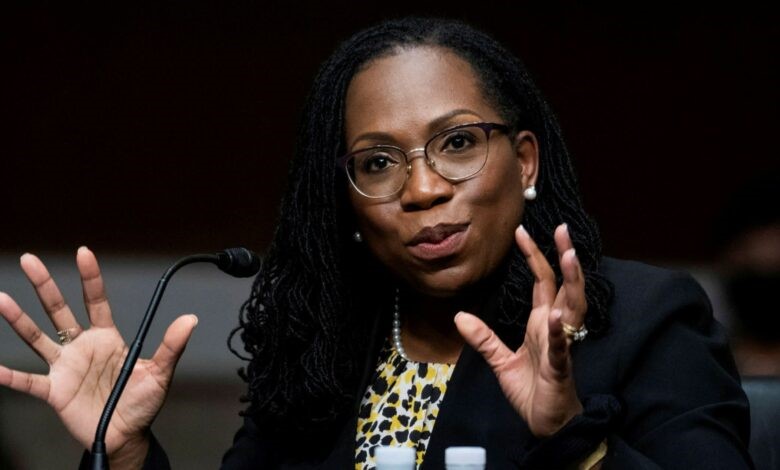Ketanji Brown Jackson’s Historic Supreme Court Nomination
By: Madelyn Hughes, Associate Editor, Vol. 27
On February 25, 2022, President Biden made history when he nominated Judge Ketanji Brown Jackson to the Supreme Court to replace the retiring liberal Justice Stephen Breyer.[i] She is the first Black woman nominated to the Supreme Court and, if confirmed, will be the first Black woman Justice.[ii] This nomination fulfils a campaign promise made by President Biden that he reiterated after Justice Breyer announced his retirement. President Biden stated, “While I’ve been studying candidates’ backgrounds and writings, I’ve made no decision except one: the person I will nominate will be someone with extraordinary qualifications, character, experience, and integrity. And that person will be the first Black woman ever nominated to the United States Supreme Court.”[iii]
Conservatives bristled at President Biden’s promise to nominate a Black woman to fill the next Supreme Court vacancy, citing discomfort with the President’s use of “affirmative action.”[iv]Filling vacancies on the federal bench is a political enterprise, with Democratic presidents nominating liberal judges and Republican presidents nominating conservative judges and this is especially true for vacancies on the Supreme Court. But numerous Republican senators such as Ted Cruz[v] were opposed to President Biden’s explicit statement of his preference for a Black woman nominee.

But this is not the first time a President has used criteria such as race, gender, or political beliefs when filling a vacancy on the Supreme Court. In a 1980 campaign speech, President Ronald Reagan promised to nominate a woman to the Supreme Court in order to mitigate accusations of his sexist attitudes towards women.[vi] President Reagan fulfilled this promise six months into his presidency when he nominated Sandra Day O’Connor, the first woman to serve on the Supreme Court.[vii] Although President George H.W. Bush did not make a similar promise, he replaced Thurgood Marshall with Clarence Thomas, another Black justice.[viii] At the time, administration officials told the press that the search for Thurgood Marshall’s replacement was almost exclusively limited to minority or female candidates.[ix] Most recently, President Donald Trump announced an intention to replace Justice Ruth Bader Ginsburg with another woman shortly after her death and ultimately nominated Justice Amy Coney Barrett, who complied with another one of President Trump’s qualifications: that the justice be pro-life.[x]
President Biden referred to his commitment to putting a Black woman on the Supreme Court as“long overdue.”[xi] The lack of diversity on the Supreme Court is not a new critique. As the people tasked with interpreting the Constitution, the Supreme Court makes decisions that affect the rights of everyday Americans.
Despite this, the demographics of the Supreme Court do not accurately reflect the general public. With only nine people serving on the Supreme Court at once, it would be impossible to create a Supreme Court completely representative of America. However, the differences between the Supreme Court and American people are stark. The current court is 80% white, compared to the 2020 census’s report that 62% of Americans are white.[i] With a 6-3 majority of conservatives on the Supreme Court, it is more conservative than the general American public, less than half of which report to be Republican or Republican leaning.[ii] Beyond race and ideology, the Supreme Court differs from a majority of the country in another way: the attendance of elite law schools. With the exception of Justice Amy Coney Barrett, all of the current justices went to Ivy League law schools, primarily Harvard and Yale.[iii]

The resume of Ketanji Brown Jackson resembles the other Supreme Court Justices in this way and others. She is a graduate of Harvard College and Harvard Law School; if confirmed, she will be the only justice to have clerked at all three levels of the federal judiciary.[xv] However, her resume has one unique professional experience that has been a point of interest: her experience as a federal public defender. Ketanji Brown Jackson was a federal public defender in Washington D.C. for two and a half years.[xvi] This would make her the first justice since Thurgood Marshall to have professional experience in criminal defense.[xvii] Given the significant decisions the Supreme Court makes regarding criminal procedure, her background as a public defender is a source of excitement for many.
Since the announcement of her nomination, there has been a mixture of reactions. In addition to taking issue with President Biden’s promise to nominate a Black woman, some top Republicans have described Ketanji Brown Jackson as a favorite of the far left,[xviii] which could signal a contentious confirmation. However, Republican Congressman Paul Ryan, related to Ketanji Brown Jackson by marriage, supports her nomination.[xix] Democrats are largely celebrating this nomination for not only the value of adding another Black voice to the court,[xx] but also because her youth means she could serve on the Supreme Court for decades.
As the Supreme Court prepares to hear cases about gun rights, abortion rights, and affirmative action in higher education, this nomination is important not only for this term, but for years to come. The Senate Democrats are aiming for a confirmation of Ketanji Brown Jackson in early April.[xxi] While history was made with this nomination, only time will tell if it will be made with her confirmation.
[i] Jeff Mason, Jarret Renshaw and Lawrence Hurley, Biden picks Ketanji Brown Jackson as historic U.S. Supreme Court nominee, REUTERS(Feb. 26, 2022 1:04 AM), https://www.reuters.com/world/us/biden-announce-us-supreme-court-pick-friday-white-house-sources-2022-02-25/.
[ii] Id.
[iii] Zachary B. Wolf, The truth about diversity on the Supreme Court, CNN ( Feb. 1, 2022 6:44PM), https://www.cnn.com/2022/02/01/politics/black-woman-scotus-nomination-diversity-what-matters/index.html#:~:text=Here’s%20the%20math%3A%20There%20have,color%2C%20a%20woman%20or%20both.
[iv] Id.
[v] Id.
[vi] Id.
[vii] Tara Subramaniam, Fact Check: Biden is not the first president to limit SCOTUS search to specific demographics, CNN (Feb. 1, 2022 3:32 PM), https://www.cnn.com/2022/02/01/politics/fact-check-presidents-supreme-court-picks-demographics/index.html.
[viii]Id.
[ix] Id.
[x] Id.
[xi] Supra n. iii.
[xii] Id.
[xiii] Id.
[xiv] Id.
[xv] Melissa Murray, A new kind of diversity on the Supreme Court: Two formidable Black voices, WASH. POST (Feb. 25, 2022 5:05 PM)https://www.washingtonpost.com/outlook/2022/02/25/brown-jackson-diversity-court-thomas/.
[xvi] Charlie Savage, As a Public Defender, Supreme Court Nominee Helped Clients Others Avoided, N.Y. TIMES (Feb. 26, 2022)https://www.nytimes.com/2022/02/26/us/politics/ketanji-brown-jackson-supreme-court.html.
[xvii] Supra n. xv.
[xviii] Nolan D. McCaskill, GOP casts Supreme Court nominee Ketanji Brown Jackson as far-left favorite, L.A. TIMES (Feb. 25, 2022 1:17 PM) https://www.latimes.com/politics/story/2022-02-25/ketanji-brown-jackson-senate-reaction.
[xix] Jake Tapper, Ariane de Vogue, Jeff Zeleny, Betsy Klien, and Maegan Vazquez, Biden nominates Ketanji Brown Jackson to be first Black woman to sit on Supreme Court, CNN (Feb. 25, 2022 5:01 PM), https://www.cnn.com/2022/02/25/politics/supreme-court-ketanji-brown-jackson/index.html.
[xx] Supra n. xv.
[xxi] Carl Hulse, Democrats are aiming for confirmation by early April, N.Y. TIMES (Feb. 25, 2022), https://www.nytimes.com/2022/02/25/us/politics/democrats-biden-supreme-court-nominee.html?name=styln-scotus-nominations®ion=TOP_BANNER&block=storyline_menu_recirc&action=click&pgtype=Article&variant=0_Control&is_new=false.
